☆ PuniPuni Youtube ☆
Intro to Japanese Verb Types: う-verbs, る-verbs, and irregular verbs – Review Notes
Today we learned that there are 3 types of Japanese verbs.
In these video review notes we will go over today’s Japanese grammar in greater detail and see some example sentences and a list of verbs!
………………………………………………………………………………..
Today’s Grammar Lesson:
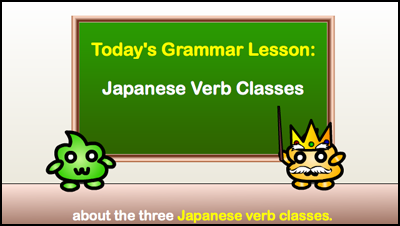
★ Today we will learn about the three Japanese verb classes.
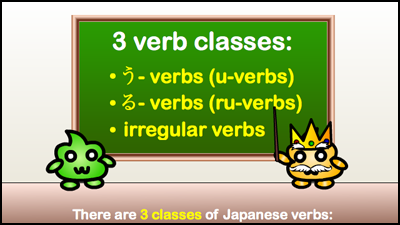
★ There are 3 classes of Japanese verbs:
★ う-verbs (u-verbs)
★ る-verbs (ru-verbs)
★ irregular verbs
………………………………………………………………………………..
う-verbs (u-verbs) and る-verbs (ru-verbs):
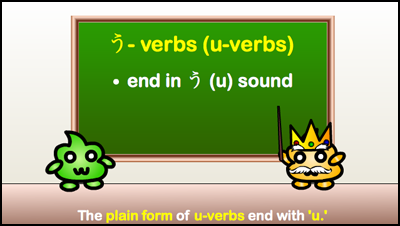
★ The first type of Japanese verbs is called う-verbs (u-verbs), and is also sometimes referred to as “group 1 verbs”

★ う-verbs (u-verbs) always end with an う (u) sound when in plain form.
★ When conjugating an う-verb, the final う (u) sound changes (more details next time).
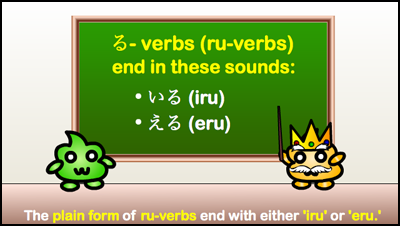
★ The second type of Japanese verbs is called る-verbs (ru-verbs), and is also sometimes referred to as “group 2 verbs.”
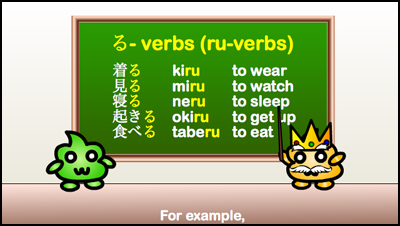
★ As you can see, る-verbs (ru-verbs) always end in る (ru), more specifically, in える (eru) or いる (iru).
★ When conjugating a る-verb, the る (more details next time).
★ So, although both る-verbs (ru-verbs) and う-verbs (u-verbs) actually end with a う (u) sound, you can tell if it is a る-verb (ru-verb) or not by checking if it ends in える (eru) or いる (iru), right?
★ Most of the time, the answer is yes. However, there are exceptions.
………………………………………………………………………………..
There are some Exceptions:
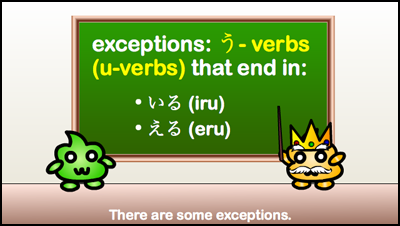
★ Sometimes う-verbs (u-verbs) can also end in いる (iru) or える (eru)!
★ So how do you figure out if this verb that ends in いる or える is anう-verb or a る-verb?!
★ Unfortunately, there is no rule that works for everything, so you will have to figure it out as you go.
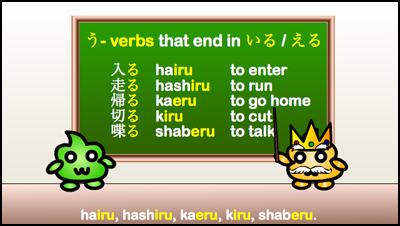
………………………………………………………………………………..
Irregular verbs AKA Group 3 verbs:
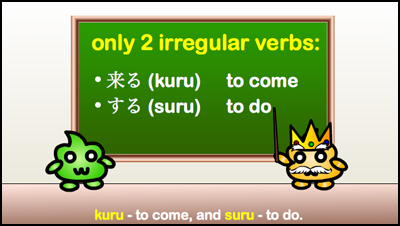
★ Luckily, there are only 2 irregular verbs in Japanese!
★ These verbs are irregular because they are not conjugated like う-verbs or る-verbs.
★ We will learn more about verb conjugations in the next several grammar lessons.
………………………………………………………………………………..
Additional Basic Information about Verbs:
★ Unlike English, verbs come at the end of a sentence or a clause in Japanese.
★ Verbs carry a lot of meaning in Japanese. The tense and the level of formality of a sentence is determined by the verb, and the meaning of the sentence largely depends on the way the final verb is conjugated.
★ Unlike English, Japanese verbs do not have different conjugations depending on the subject (I, you, she, they, etc.) In this way, they are much more simple!
★ In Japanese, plain form (or masu form in a formal sentence) is used for both the simple present (factual or habitual) and future tense.
★ In Japanese, the irregular verb する (suru) is used for many different things including turning nouns into verbs.
★ For example, 勉強 (benkyō) is a noun that means study. When you add する (suru), it becomes a verb 勉強する (benkyō suru).
………………………………………………………………………………..
Example Sentences with う-verbs (Plain Form):
Number 1:
そとであそぶ。
Soto de asobu.
(I) will play outside. / (I) play outside.
………………………………………………………………………………..
Number 2:
ここで待つ。
Koko de matsu.
(I) will wait here. / (I) wait here.
………………………………………………………………………………..
Examples Sentences with る-verbs (Plain Form):
Number 1:
8時に起きる。
Hachiji ni okiru.
(I) get up at 8:00. / (I) will get up at 8:00.
……………………………………………………………………………….
Number 2:
ここでねる。
Koko de neru.
(I) sleep here. / (I) will sleep here.
………………………………………………………………………………..
Examples Sentences with irregular verbs:
Number 1:
学校でする。
Gakkō de suru.
(I) do (it) at school. / (I) will do (it) at school.
……………………………………………………………………………….
Number 2:
学校に来る。
Gakkō ni kuru.
(I) come to school. / (I) will come to school.
………………………………………………………………………………..
List of Japanese Verbs in Plain Form:
………………………………………………………………………………..
List of some common う-verbs:
洗う あらう arau to wash
歩く あるく aruku to walk
遊ぶ あそぶ asobu to play
会う あう au to meet
黙る だまる damaru to be silent
騙す だます damasu to trick
選ぶ えらぶ erabu to choose / pick
太る ふとる futoru to gain weight
頑張る がんばる ganbaru to do one’s best
入る はいる hairu to enter
話す はなす hanasu to speak / talk
払う はらう harau to pay
光る ひかる hikaru to shine
行く いく iku to go
買う かう kau to buy
勝つ かつ katsu to win
聞く きく kiku to listen
守る まもる mamoru to protect
待つ まつ matsu to wait
持つ もつ motsu to hold / have
泣く なく naku to cry
怒る おこる okoru to get angry
思う おもう omou to think / believe
終わる おわる owaru to end
泳ぐ およぐ oyogu to swim
知る しる shiru to know
立つ たつ tatsu to stand
使う つかう tsukau to use
動く うごく ugoku to move
歌う うたう utau to sing
……………………………………………………………………………….
List of some common る-verbs:
開ける あける akeru to open
褒める ほめる homeru to praise
惚れる ほれる horeru to fall in love
生きる いきる ikiru to live
入れる いれる ireru to put in
考える かんがえる kangaeru to think
借りる かりる kariru to borrow
片付ける かたづける katazukeru to tidy up
数える かぞえる kazoeru to count
消える きえる kieru to disappear
聞こえる きこえる kikoeru to hear
答える こたえる kotaeru to answer
負ける まける makeru to lose
見る みる miru to see / look
見せる みせる miseru to show
覚える おぼえる oboeru to remember
落ちる おちる ochiru to fall
教える おしえる oshieru to teach
捨てる すてる suteru to throw away
助ける たすける tasukeru to help / save
足りる たりる tariru to be enough
疲れる つかれる tsukareru to get tired
忘れる わすれる wasureru to forget
辞める やめる yameru to quit
……………………………………………………………………………….
Want to learn over 600 Japanese verbs and have a quick and easy reference to all of their conjugations?? We recommend the Complete Japanese Verb Guide from Tuttle! ⬇
In addition to being a quick but thorough reference to over 600 verbs and their conjugations, it also includes hundreds of useful example sentences! Get it now!
……………………………………………………………………………….
Conclusion:
Today we learned about the three types of Japanese verbs. Next time, we will learn more about how to conjugate these verbs. If you have any questions, leave a comment below!
……………………………………………………………………………….
Do you want a Japanese tutor?
Take Japanese Skype Lessons with Professional Japanese Teachers on kakehashijapan.com!
………………………………………………………………………………..
………………………………………………………………………………..











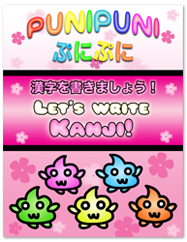


2 comments
もし「太る」は「To gain weight」、日本語で「To loose weight」はどの様に言いますか?大変参考になりました。宜しくお願いします。
Comment by Majic on 12/07/2013 at 10:22 amGreat question! (◕ω◕)☆ ‘To lose weight’ in Japanese is 痩せる(やせる), which is a る-verb (although 太る(ふとる) is an う-verb).
Comment by PuniPuni on 12/11/2013 at 7:02 am